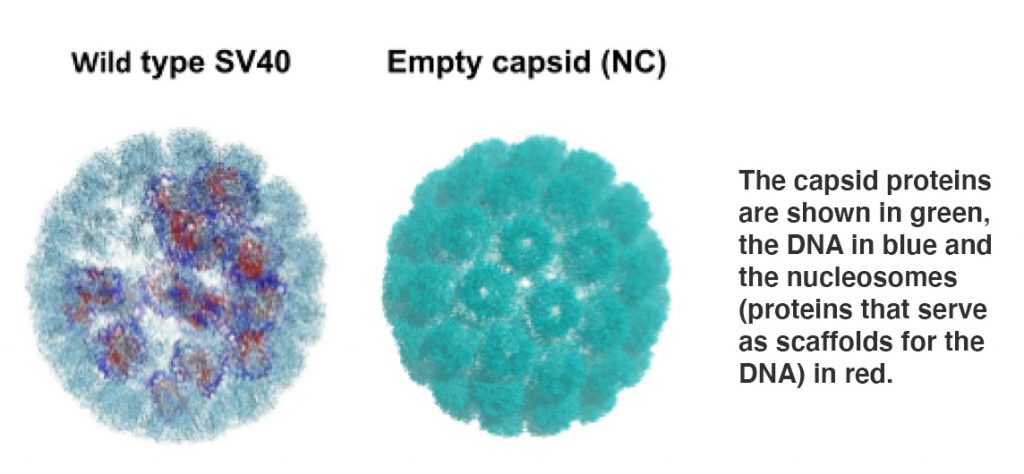The Product
BioCapsid Therapeutics’ novel therapeutic agent is the empty capsid (nanocapsid, NC) of the small (Vervet) monkey virus SV40.
The empty capsid is composed of 360 identical units of the major capsid protein VP1, arranged as 72 pentamers. It does not contain any genetic material. This natural agent is, so far, the only reagent that responds to complex pathological disorders for which there is no cure.
The NC treatment is a paradigm shift at several levels for the treatment of diseases with complex pathology (https://doi.org/10.18632/oncotarget.27448).
- The NCs are multi-targeted. They affect the gene expression profile of the host, leading to activation of numerous pathways that promote tissue repair.
- The NCs affect different genes in different diseases, responding to their respective pathophysiology.
- The elicited signaling pathways become modified with time, adjusting to the recovery process of the treated host.
- The NCs induce broad host anti-microbial defense mechanisms, unlike antibiotics that directly kill pathogens and contribute to the rise of drug-resistant bacteria.
- The NCs have a negligible effect on healthy animals, suggesting no severe side effects when applied as therapy.
These properties taken together indicate that the NCs bring the sick body to homeostasis – a balance of its physical, chemical and biological state. The unique properties of the NCs are at least partly related to their interaction with the TAM (Tyro3, Axl, Mer) receptor family (https://doi.org/10.1016/j.chom.2013.05.005)
In different experiments using animal models we have shown that:
- The survival rate of rats inflicted with severe sepsis and pre-treated with NCs (in the absence of antibiotics) is 75%, while the rats that received a placebo all died within four days (https://doi.org/10.18632/oncotarget.27448).
- Pre-treatment with NCs increased the survival rate of animals with acute kidney injury (AKI) induced by mercury poisoning (https://journals.plos.org/plosone/article?id=10.1371/journal.pone.0002998).
- In rats inflicted with traumatic brain injury (TBI), post-injury treatment with NCs improved brain function, indicating that pre-treatment is not an inherent requirement of NC therapy (unpublished).
The small monkey virus SV40 was declared by the NIH to be an agent that is not associated with disease in healthy adult human (https://osp.od.nih.gov/biotechnology/nih-guid elines/). As the NCs are composed of a single protein and do not contain the viral genome, they are even more innocuous.
Below is a high resolution, molecular model of the wild type virus and the empty capsid, created through small angle X-ray scattering (SAXS), by a group of scientists at the Hebrew University of Jerusalem (R. Asor, G. Saper, A. Ginsburg, O. Ben-Nun-Shaul, S. Kler, A. Oppenheim, D. Harries, U. Raviv).

